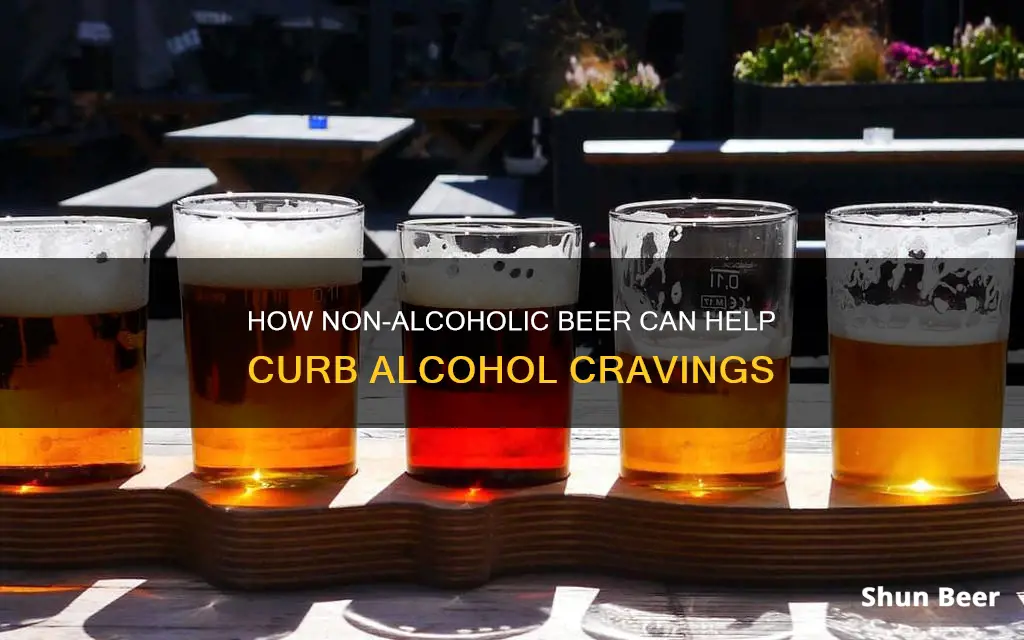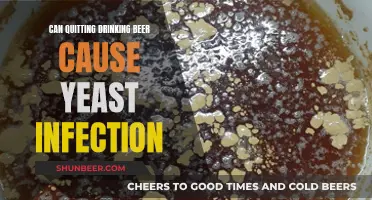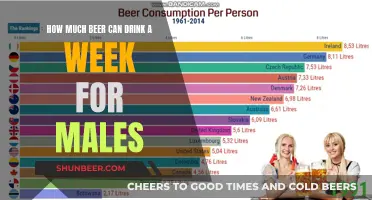
Non-alcoholic beer is often marketed as a safe alternative to alcoholic drinks, but it may not be the best option for those trying to quit drinking. While it can help reduce alcohol consumption, non-alcoholic beer still contains trace amounts of alcohol, typically around 0.5% alcohol by volume (ABV). This can be problematic for recovering alcoholics, as the taste, smell, and appearance of non-alcoholic beer can trigger cravings and potentially lead to relapse. The psychological associations with drinking beer can be powerful, and the anticipation of alcohol can release dopamine, creating a slippery slope for those striving to maintain sobriety. However, non-alcoholic beer has helped some individuals cut down on their drinking, especially those who want to enjoy the taste and ritual of beer without the intoxicating effects of alcohol. Ultimately, the effectiveness of non-alcoholic beer as a tool for quitting drinking varies from person to person, and individuals in recovery should carefully consider the potential risks and benefits before consuming it.
What You'll Learn
- Non-alcoholic beer can trigger cravings and cause relapses
- It can be a powerful trigger for recovering alcoholics
- Non-alcoholic beer can be a slippery slope for addicts
- It can cause frustration and euphoric recall in recovering alcoholics
- Non-alcoholic beer can be a useful tool for reducing alcohol intake

Non-alcoholic beer can trigger cravings and cause relapses
The anticipation of alcohol may yield the same reaction as drinking it. Placebo effects can be experienced without actually consuming alcohol. Therefore, the smell and consistency of a non-alcoholic beverage could take a person back to a time before recovery—when alcohol dictated life choices. These drinks could spur cravings and give way to relapse.
For a recovering alcoholic, drinking non-alcoholic beer serves as a slippery slope. Even though you won't get drunk, the urges and triggers it creates can be too powerful. It is best to stay on the safe path and avoid non-alcoholic beer.
Beer and Muscle Gain: Is It Possible?
You may want to see also

It can be a powerful trigger for recovering alcoholics
Non-alcoholic beer has the potential to be a powerful trigger for recovering alcoholics. While it may seem like a safe alternative to alcoholic drinks, it can pose several risks for those working towards sobriety.
Firstly, non-alcoholic beer typically still contains trace amounts of alcohol. Although the amount is usually minimal, at around 0.5% alcohol by volume (ABV), it can still contribute to the rationalisation of having a stronger drink, potentially undoing years of progress and leading to a relapse.
Secondly, the look, smell, and taste of non-alcoholic beer are almost identical to those of regular beer. This sensory experience can be a significant trigger for recovering alcoholics, evoking feelings of euphoric recall, where the negative consequences of addiction are ignored, and cravings are intensified. The anticipation of alcohol consumption alone can lead to increased dopamine levels, which produce pleasure, and this can occur even without the presence of alcohol.
Additionally, drinking non-alcoholic beer can serve as a behavioural crutch, providing a false sense of security and potentially leading to a slippery slope of increased cravings and triggers. Recovering alcoholics must actively work to avoid relapses by establishing new hobbies, friendships, and behaviours that do not revolve around drinking.
The decision to consume non-alcoholic beer during recovery should be carefully considered, and it is essential to weigh the potential psychological impacts. Consulting with a healthcare professional or addiction specialist is recommended to ensure a safe and effective path towards sobriety.
Drinking Beer on Gulf Shores Beach: What's Allowed?
You may want to see also

Non-alcoholic beer can be a slippery slope for addicts
Non-alcoholic beer is often marketed as a safe alternative to alcoholic drinks, but it may not be the best option for those recovering from alcohol addiction. While it may seem like a harmless choice, non-alcoholic beer can pose several risks and trigger a relapse for those struggling with addiction.
The Risks of Non-Alcoholic Beer
Firstly, it is important to note that non-alcoholic beer is not always alcohol-free. While some products claim to have 0.0% ABV, by law, non-alcoholic beers can contain up to 0.5% alcohol. This means that even a small amount of non-alcoholic beer can lead to detectable levels of alcohol in the body. For individuals with liver impairments, consuming non-alcoholic beer can result in much higher blood alcohol levels than expected.
Secondly, the smell, taste, and appearance of non-alcoholic beer are almost identical to regular beer. This sensory experience can be a powerful trigger for recovering alcoholics, evoking memories of their active addiction and intensifying cravings. The anticipation of alcohol consumption can lead to increased dopamine levels, which contribute to feelings of pleasure and reward. As a result, non-alcoholic beer can create a "slippery slope" for addicts, increasing the risk of relapse even without the presence of significant amounts of alcohol.
The Psychological Impact
The psychological associations with drinking beer are complex and deeply rooted. For individuals in recovery, the act of drinking beer, even a non-alcoholic one, can evoke powerful emotions and memories. This can lead to a condition called euphoric recall, where the recovering addict selectively remembers the positive aspects of their addiction while ignoring the negative consequences. The taste, smell, and feel of non-alcoholic beer can be triggering, making it a risky choice for those striving to maintain sobriety.
Alternatives to Non-Alcoholic Beer
Instead of reaching for a non-alcoholic beer, there are other alternatives that can be safer options for recovering alcoholics. Water, soda with fresh lime juice, or even a cup of tea are all drinks that can be enjoyed without the risk of triggering a relapse. Making lifestyle changes, such as developing new hobbies, finding social connections that support sobriety, and practicing stress management techniques, can also help individuals in their recovery journey.
While non-alcoholic beer may be a helpful tool for some people looking to reduce their alcohol intake, it can be a dangerous choice for recovering alcoholics. The potential triggers and psychological impacts of these beverages can create a slippery slope, increasing the risk of relapse and undoing progress in recovery. It is crucial for individuals in recovery to carefully consider the risks and consult with healthcare professionals or addiction specialists before consuming non-alcoholic beer.
Beer and Crestor: Is One Drink Okay Daily?
You may want to see also

It can cause frustration and euphoric recall in recovering alcoholics
Non-alcoholic beer is often marketed as a safe alternative to alcoholic beverages. However, for recovering alcoholics, it can pose several risks and dangers. One such danger is its potential to trigger frustration and euphoric recall, which can increase the likelihood of a relapse.
Euphoric recall is a form of selective memory where a recovering addict reminisces about their active addiction with happiness and comfort, glorifying the positive experiences while ignoring the negative consequences. The negative experiences and consequences of addiction are pushed out of the mind, and only the "good old days" are remembered. This can be a powerful trigger for someone in early recovery, as it can cause intense cravings and set the stage for a relapse. The look, smell, taste, and even the label and bottle of non-alcoholic beer can be strikingly similar to regular beer, evoking the same sensory experiences and triggering euphoric recall.
Research has shown that the smell of beer alone may be enough to trigger cravings and a subsequent relapse among individuals with alcohol use disorder. In a study conducted by California scientists, rats were trained to associate certain smells with alcohol consumption. The investigators found that both alcohol and the anticipation of alcohol increased levels of dopamine, a brain chemical associated with feelings of pleasure and elation. While this study was conducted on animals, it suggests that the smell of non-alcoholic beer may have a similar effect on recovering alcoholics, triggering euphoric recall and increasing the risk of relapse.
It is important to note that non-alcoholic beer can contain trace amounts of alcohol, typically around 0.5% alcohol by volume (ABV). While this amount is unlikely to cause any noticeable effects, it could potentially pave the way for rationalizing the consumption of stronger alcoholic beverages. Additionally, for individuals with liver impairments, consuming non-alcoholic beer may result in higher blood alcohol levels than expected, which could lead to positive alcohol tests.
To avoid the potential risks and triggers associated with non-alcoholic beer, recovering alcoholics are advised to stick with water or soft drinks at social gatherings. It is crucial to establish new hobbies, friendships, and behaviors that do not revolve around drinking and to avoid anything that smells like alcohol. Seeking support from a recovery community and developing a relapse prevention plan can also be crucial steps in maintaining sobriety and avoiding triggers such as euphoric recall.
Beer and Birth Control: Is It Safe to Mix?
You may want to see also

Non-alcoholic beer can be a useful tool for reducing alcohol intake
Secondly, non-alcoholic beer can help individuals cut back on their drinking and reduce long-term problems, including addiction. For example, if someone usually drinks a couple of beers after work, they could switch to a low-alcohol version, helping them moderate their intake and lower the risk of developing an alcohol use disorder.
Thirdly, non-alcoholic beer can be a good option for those who want to quit drinking but struggle with social situations where alcohol is involved. It allows them to still participate in drinking occasions without consuming alcohol, reducing feelings of isolation and deprivation. This can be especially helpful in the early stages of recovery when cravings and triggers are more intense.
However, it is important to note that non-alcoholic beer may not be suitable for everyone. For individuals with a history of alcohol abuse or addiction, the taste, smell, and appearance of non-alcoholic beer can be powerful triggers that lead to cravings and potentially relapse. Additionally, some non-alcoholic beers may still contain trace amounts of alcohol, which can be risky for those striving for complete abstinence. Therefore, it is crucial for individuals in recovery to carefully consider the potential risks and discuss their decision with a healthcare professional or addiction specialist.
Beer and Teeth Whitening: What You Need to Know
You may want to see also







